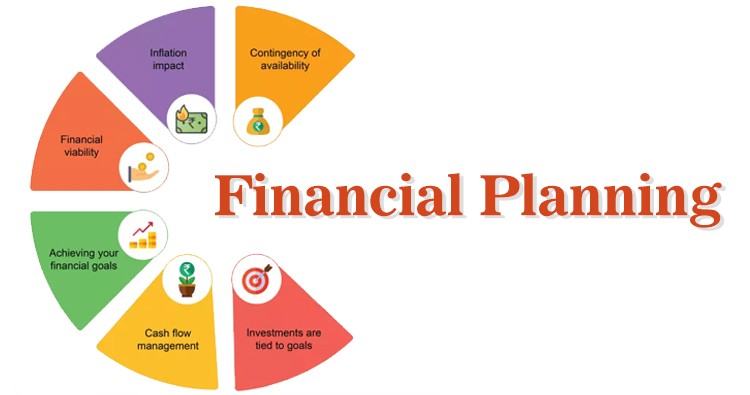Financial planning is the process of organizing your finances and setting goals for the future. It includes creating a budget, building an emergency fund and investing.
It also involves paying down debt and using the time-tested method of “paying yourself first,” meaning saving or investing before spending money on other things.
Goal Setting
Setting financial goals is an important step in your financial planning journey. It provides motivation to take action, helps you stay on track and achieve your financial dreams. It also encourages discipline and provides feedback on how well your budgeting efforts are working. In addition to helping you improve your financial savvy, achieving your goals can help you reduce stress and build a more prosperous future.
Financial goals are essential to your success because they allow you to prioritize spending, saving and investment decisions based on what matters most to you. They can also help you build your emergency fund, pay off debt and save for retirement.
Financial goals should be specific and measurable, with a clear time frame. They should be categorized into three categories: short-term, mid-term and long-term goals. Short-term goals should be attainable within a year, while mid-term goals can take up to five years to accomplish. Long-term goals are more complex, such as buying a house or saving for retirement. Setting a timeline will ensure that you reach your goals on time.
Budgeting
The budgeting process is an essential part of financial planning. It allows you to create a spending plan and set savings goals that will help you achieve your financial goals. It also helps you avoid debt and manage expenses.
To start your budget, figure out how much money you make per month after taxes. Add in other income sources, such as investment and Social Security income, as well as alimony or child support. Next, calculate your monthly expenses. This includes rent or mortgage, food, utilities, transportation costs, insurance premiums and any other necessary expenses. Don’t forget to include an emergency fund in your calculations.
A budgeting process that incorporates HR operations enables you to align talent management strategies with business objectives and facilitate informed decision-making. In addition, a robust planning, forecasting and budgeting process can improve the accuracy of your financial reports and analytics. This can lead to more effective business processes and more revenue growth.
Investing
Investing is a way to put money to work for yourself by purchasing assets such as stocks or mutual funds. While this can be risky, it is also a way to increase your wealth over time.
Developing an investment plan can help you reach long-term financial goals, such as buying a home or saving for retirement. It’s also important to consider the tax benefits of investing. Many financial planners can assist you in this area. However, it’s possible to do this on your own through online tools and robo-advisors.
Before you start investing, decide why you want to do so and how much you can afford to invest. Keep in mind that it may take years for your investments to grow, so you should be prepared to invest for a long period of time. Another important consideration is your risk tolerance. If you’re not willing to take on a higher level of risk, you should stick with savings accounts and other low-risk investments.
Insurance
In addition to creating a budget, paying off debt, and investing, financial planning also includes insurance planning. This is because unforeseen events can occur that could derail even the most carefully planned financial goals. A good financial plan includes adequate insurance coverage to mitigate these risks. This can include life, property, auto and health insurance.
While financial planning may sound complicated, it can be as simple as identifying your goals, time horizons, and income/expenses. From there, you can create a budget to work towards those goals and start saving for the long term. A CERTIFIED FINANCIAL PLANNER professional can assist you with developing a comprehensive strategy that incorporates everything from debt management to retirement planning.
Insurance is a key component of any financial plan, and a knowledgeable advisor can help you understand your options and select the right policy for your needs. Besides being a safety net against unforeseen events, insurance can help diversify your portfolio and provide added predictability and tax advantages. It can also nurture the habit of saving on a regular basis, which is essential to building long-term wealth.
Taxes
Taxes are a significant part of financial planning, as they affect your ability to accumulate wealth. This includes income taxes on wages, interest, dividends, capital gains, and rental of property. It also includes taxes on consumption of goods and services. It’s important to understand how different taxes work so that you can maximize your tax savings.
Financial planning involves determining your current financial situation and creating a budget that fits your needs. It also helps you establish short- and long-term financial goals. It also includes risk management, retirement planning, and investment strategies. It can help you save money and achieve your goals faster.
While paying taxes is one of life’s certainties, it is possible to minimize your tax liability and end each year with more money in your bank account. This is accomplished through careful tax preparation and a well-planned strategy. Taxes can be a major source of confusion, and it’s important to consult with a certified financial planner to ensure that you’re taking advantage of all the available deductions and credits. This can help you save thousands of dollars each year.

















Leave a comment